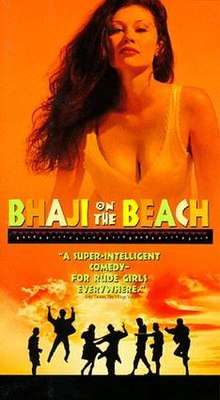Bhaji on the Beach
Bhaji on the Beach is a 1993 British comedy-drama film directed by Gurinder Chadha and written by Meera Syal.
| Bhaji on the Beach | |
|---|---|
 Video cover | |
| Directed by | Gurinder Chadha |
| Produced by | Nadine Marsh-Edwards |
| Screenplay by | Meera Syal |
| Story by | Meera Syal Gurinder Chadha |
| Starring | Kim Vithana Jimmi Harkishin Sarita Khajuria |
| Music by | John Altman Craig Pruess |
| Cinematography | John Kenway |
| Edited by | Oral Norrie Ottey |
Production company | Channel Four Films Umbi Films |
| Distributed by | First Look International Columbia TriStar Home Video |
Release date |
|
Running time | 101 minutes |
| Country | United Kingdom |
| Language | English Hindi Punjabi |
| Box office | $735,192(United States) |
Plot
A community group of British women (mostly Punjabis of various faiths) of different generations, take a group day out to the Blackpool Illuminations. The tensions of the generation gap torn between tradition and modernism as well as the personal upsets and issues of the women and girls come to boiling point as they spend the day out.
Simi, the head of the group, has modern social beliefs about feminism that the older club women object to, however she manages to be the caring, in-control figure who holds the day together despite tensions. Ginder is escaping from her abusive criminal husband with her young son and fighting the stigma of single parent and her son's pleas to have both a mother and father again. Two boy-crazy teenage girls meet with the disapproval of the conservative older ladies. Hashida is a high flying student who is about to start medical school, yet would prefer to be studying painting. She has hidden her Afro-Caribbean boyfriend Oliver from her family for a year, but now she's pregnant by him and now they must decide about the child and their relationship: would it stand the strain of social disapproval. Asha, a devout Hindu and Bollywood-cinema fan, is stuck with a humdrum life in her convenience shop and finds excitement and a sense of fulfilling missed opportunities in life with a charming, eccentric, artistic English actor in Blackpool, yet feels she must stay in her marriage.
In the end, most of the characters have their stories left open. We do not see what happens to Asha or Oliver and Hashida and the final scenes of these characters seem quite content but open-ended. Ginder and her son escape the violence of her husband and the most conservative characters receive a humorous treatment in a strip club.
Cast
- Zohra Sehgal as Pushpa
- Shaheen Khan as Simi
- Kim Vithana as Ginder
- Jimmi Harkishin as Ranjit
- Sarita Khajuria as Hashida
- Mo Sesaynas Oliver
- Rudolph Walker as Oliver's father
- Lalita Ahmed as Asha
- Amer Chadha-Patel as Amrik
- Nisha Nayar as Ladhu
- Renu Kochar as Madhu
- Surendra Kochur as Bina
- Souad Faress as Rekha
- Tanveer Chani as Balbir
- Bharti Patel as Refuge Woman
Reception
Sight & Sound said it 'offered some trenchant observations about prevalent prejudices and what the younger, British-born generation of Asians had to offer. In Bhaji on the beach, her feature film debut, Chadha has tried to adhere to this code of Buzurgh loyalty (the age span ranges from 6 to the late 60's), while trying to encompass the more awkward and raw elements thrown up by contemporary Asian women's lives.[1] Rotten Tomatoes retrospective collected reviews from 8 critics to give the film a score of 88%.[2][3][4][5][6][7]
Year-end lists
- Honorable mention – Kenneth Turan, Los Angeles Times[8]
References
- Anwar Farrah (February 1994). "Bhaji on the Beach". Sight and Sound. 4 (2): 47–8.
- "Bhaji On the Beach". Rotten Tomatoes. Retrieved 14 September 2013.
- "'Bhaji on the Beach'". Washingtonpost.com. 8 July 1994. Retrieved 14 September 2013.
- Sragow, Michael. "Bhaji on the Beach". The New Yorker. Retrieved 14 September 2013.
- Liebenson, Donald (23 September 1994). "Bhaji On The Beach Movie Review (1994)". Roger Ebert. Retrieved 14 September 2013.
- "MOVIE REVIEW : 'Bhaji on the Beach': More Than Sand, Surf : Gurinder Chadha's film is an insightful look at the difficulties of bridging cultures and generations, but it never forgets to have fun. - Los Angeles Times". Articles.latimes.com. 22 June 1994. Retrieved 14 September 2013.
- Maslin, Janet (19 March 1994). "Movie Review - Bhaji On the Beach - Review/Film Festival; Cultures (and Sexes) Clashing in England - NYTimes.com". Movies.nytimes.com. Retrieved 14 September 2013.
- Turan, Kenneth (25 December 1994). "1994: YEAR IN REVIEW : No Weddings, No Lions, No Gumps". Los Angeles Times. Retrieved 20 July 2020.
Bibliography
- Banerjee Bidisha (Autumn–Winter 2009). "Travelling bodies: Gender, Nationalism and Diasporic Identity". Asian Cinema. 20 (2).
- Travelling bodies:Gender, Nationalism and Diasporic Identity Banerjee Bidisha Asian Cinema V20 n 2 Autumn–Wintwer 2009
- Cultural difference and exchange: a future for European Film. Eleftheriotis, Dimitris. Screen V41 n 1 Spring 2000.
- Representing the space of diaspora in contemporary cinema. Ciecko, Anne. Cinema JOurnal, v38 n3 Spring 1999
- No title. O'Neill, Eithne, Positif n447 May 1998
- Mendes, AC. “Triangulating Birmingham, Blackpool, Bombay: Gurinder Chadha’s Bhaji on the Beach”, Anglo Saxonica, III.1, 325-336.